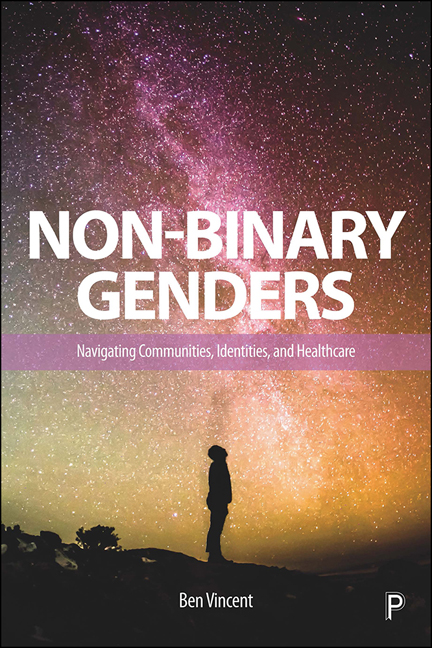Book contents
- Frontmatter
- Dedication
- Contents
- List of Figures and Tables
- Notes on the Author
- Acknowledgements
- Introduction
- 1 Reviewing Non-Binary: Where have we Come From?
- 2 Doing and Being: My Relationship with this Work, and how it was Done
- 3 ‘Not Trans Enough’: The Relationship Between Non-Binary Gender Identities, Uncertainty and Legitimacy
- 4 Non-Binary Times, Non-Binary Places: Communities and their Intersections
- 5 Views of the Clinic: Non-Binary Perceptions and Experiences of General Healthcare Services
- 6 A Strong Motivation to Tick The Boxes: Non-Binary Perceptions and Experiences of Gender Identity Clinics
- Conclusion
- References
- Index
4 - Non-Binary Times, Non-Binary Places: Communities and their Intersections
Published online by Cambridge University Press: 10 March 2021
- Frontmatter
- Dedication
- Contents
- List of Figures and Tables
- Notes on the Author
- Acknowledgements
- Introduction
- 1 Reviewing Non-Binary: Where have we Come From?
- 2 Doing and Being: My Relationship with this Work, and how it was Done
- 3 ‘Not Trans Enough’: The Relationship Between Non-Binary Gender Identities, Uncertainty and Legitimacy
- 4 Non-Binary Times, Non-Binary Places: Communities and their Intersections
- 5 Views of the Clinic: Non-Binary Perceptions and Experiences of General Healthcare Services
- 6 A Strong Motivation to Tick The Boxes: Non-Binary Perceptions and Experiences of Gender Identity Clinics
- Conclusion
- References
- Index
Summary
While community spaces can be seen to constrain queer subjectivities, then, queer identifications are also negotiated, vocalised and performed within community politics and locales. (Hines, 2010: 608)
Introduction
Time vitally intersects with non-binary identity negotiation across different forms of social interaction. Time spent introspecting can change self-conceptualisation, and time spent interacting with others can endear, or alienate. How an individual reacts to, interacts with, is affected by, or contributes to a particular community is dependent on the relationship an individual has with themselves. This changes over time, and may be shaped by communities, including those an individual is not a member of. Further, time is a critical and direct factor in particular circumstances that intersect with non-binary narratives, such as how long an individual may wait for a GIC appointment (see Pearce, 2018, chapter five), or how long an individual has benefited from (or lacked) community support.
Space is unavoidably connected to time in such contexts; for example, in cases where an individual's trans/non-binary status may be known in some settings but not others. The family home or the workplace may be spaces that restrict autonomy of expression, while queer community spaces may enable exploration.
While the title of this chapter was inspired by Halberstam's In a Queer Time and Place (2005), it otherwise does not directly build on postmodern, futurist work linking queerness with temporality (for example, Edelman, 2004; Muñoz, 2009). Rather, I draw attention to and unpack relationships with times and places that recur as sites of social significance for non-binary people, and the negotiation of identity. This builds on implicit references and crosslinks to time and place in Chapter 3, using time and space to collectively consider and connect aspects of lived experience through a sociological lens. This takes as axiomatic that the symbolic meanings ascribed to particular times and/or places are fundamentally informed by the interactions had within them.
I begin this chapter by considering how non-binary identities are negotiated over time, and how differences in subject positionality (particularly in relation to communities and medical practice) inform such a process.
Information
- Type
- Chapter
- Information
- Non-Binary GendersNavigating Communities, Identities, and Healthcare, pp. 101 - 132Publisher: Bristol University PressPrint publication year: 2020
